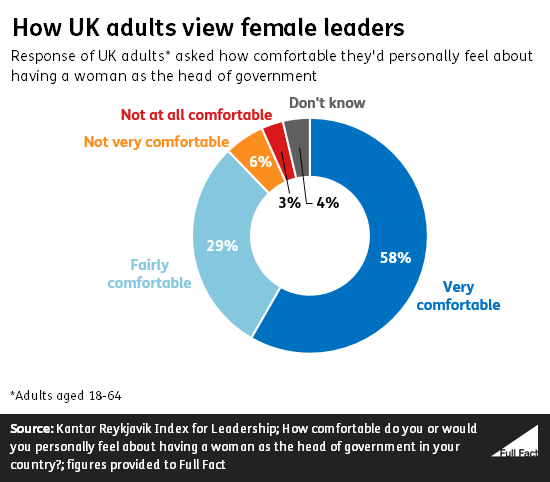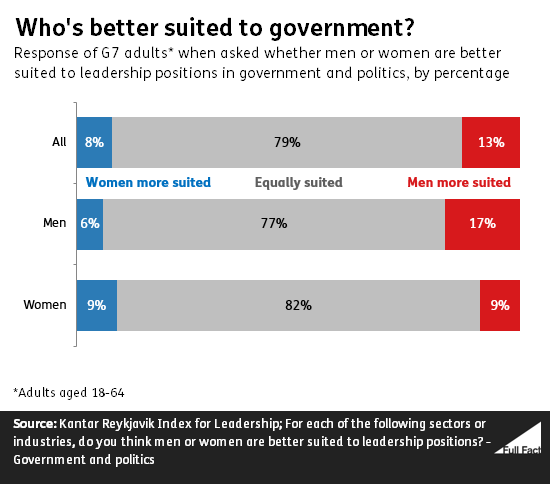“The Reykjavik Index for Leadership ranks… G7 countries in terms of the percentage of people who would be comfortable with a female head of state. The U.K., which is currently led by Prime Minister Theresa May, came first with 58%”
Axios, 27 November 2018
Market research company Kantar recently put out some figures about how different countries view female leaders.
It surveyed around 900 working-age adults (age 18 to 64) in each of the G7 countries (UK, USA, France, Canada, Japan, Germany and Italy). In four of the seven countries less than half of people would be “very comfortable” with a female head of government, according to Kantar’s findings.
In the UK, the published figures show 58% of people would feel “very comfortable” with a female head of government.
But it’s not correct to say based on this that 58% are “comfortable”. Nor is it correct to assume that everyone who didn’t say they were “very comfortable” with a female leader is uncomfortable. Here’s why:
Honesty in public debate matters
You can help us take action – and get our regular free email
9% of UK adults surveyed said they were uncomfortable with a female leader
Kantar told us that the exact question asked was:
“How comfortable do you or would you personally feel about having a woman as the head of government in your country?”
That hypothetical phrasing was used even if the country actually had a female head of government—as is the case in the UK and Germany. (And it’s possible that fact in itself would have influenced the results in those countries).
The answers respondents could choose from ranged from very or fairly comfortable to not very or not at all comfortable. They could also choose ‘don’t know’.
So respondents could choose a range of options to express how comfortable with a female leader they were.
The report by Kantar shows us that many people answered “very comfortable” but not how many answered with the other options. So although 58% of people in the UK were ‘very comfortable’ with the idea of a female head of government, the proportion that were either fairly or very comfortable was higher.
By the same reasoning, you also can’t infer from the published data how many people in each country would be uncomfortable with a female head of state.
Kantar gave us the full UK results to the question. These showed that in the UK, 58% of people said they were “very comfortable” with a female leader and another 29% said they were “fairly comfortable”. 9% said they were not very or not at all comfortable.

79% of adults in the G7 think men and women are equally suited to leadership positions in government and politics
There’s a limit to how much the data can tell us about attitudes towards women as heads of government across the G7. Kantar didn’t ask respondents how they would feel about having a male head of government—so we can’t compare the two sets of figures.
It also didn’t ask any follow up questions as to why people were comfortable (or not) with women as heads of government—for example if it was linked to their gender, the performance of particular high profile politicians, or a general distrust of politicians.
Kantar did ask respondents whether they thought men or women are more suitable for leadership positions in government and politics more widely (rather than as the out-and-out head of state).
It found that while between 23% and 58% of adults in each G7 country felt “very comfortable” with a female head of government, a far higher number (79% ) of adults felt men and women are equally suited to leadership positions in government and politics.
8% felt women were more suited to these positions than men and 13% felt men were more suited than women.


